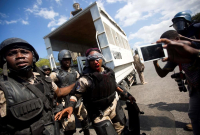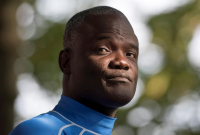Support strong Canadian climate journalism for 2025
In a photo posted to Twitter last summer, Gilbert Mirambeau Jr. sits on a couch in Montreal, wearing a blindfold and holding up a cardboard sign with a handwritten Creole message that reads: "Where is the PetroCaribe money?"
The now viral photo, posted on Aug. 14 to commemorate a 1791 slave uprising, served as a catalyst for a series of massive street protests that have been shaking the Caribbean country. Fuelled by social media, the protests have revealed the depth of anger over the rising cost of living and the alleged disappearance of billions of dollars from PetroCaribe — an oil subsidy program intended to help the impoverished Haitian people.
Mirambeau, a Haitian-Canadian filmmaker who divides his time between the two countries, said he was in Canada last summer when he became fascinated by the debate on social media over the alleged mismanagement of the PetroCaribe fund, a 2005 pact under which Venezuela provided oil to Caribbean nations with long-term, low-interest financing.
The savings on oil were supposed to be used to fund economic and social programs, but Mirambeau and many Haitians say it disappeared into the pockets of government officials, who spent it on extravagant luxuries such as mansions, casinos, and cars.
"I was witnessing this, and the whole night I couldn't sleep," said Mirambeau, who donned a blindfold in the picture to symbolize justice. "I had to play my part, in a sense."
Mirambeau, 35, said his message was posted about a month after government fuel hikes in July 2018 spurred riots among a population struggling to pay for basic staples. It was retweeted by a popular rapper and actor, and other Haitians quickly joined in, using the hashtag #petrocaribechallenge.
Mirambeau became part of a loose coalition of leaders and activists involved in organizing a series of protests, each designed to take place on a significant date in Haiti's history. Since last year, hundreds of thousands of demonstrators have taken to the streets to protest corruption and demand the resignation of the country's president, Jovenel Moise.
"Social media played a big part because we could point fingers at the senators, deputies, state members, and it was in their face," he said.
The most recent uprisings, which began Feb. 7, led to the Canadian government issuing a travel warning for Haiti. More than 100 Canadians had to be airlifted to the airport last week to avoid blockades along the country's highways, where armed protesters threw rocks, fired weapons and set fire to burning tires during sometimes violent protests.
Mirambeau blamed the violence on gang members infiltrating what is a peaceful movement. "The movement is not violent," he said. "You had a million people in the street, and they could have destroyed everything, but they were not violent."
He said Haitians are fed up after years of alleged corruption by authorities, whom he says have largely mismanaged the PetroCaribe money and the billions of dollars designed to help the country recover from a 2010 earthquake that decimated the country's infrastructure.
"What we feel is more than rage," he said. "It's social apartheid. You have the government on the side making money with our taxes and money."
A Haitian Senate investigation has alleged embezzlement by at least 14 former officials in ex-president Michel Martelly’s administration, but no one has been charged. Late last week, Haitian Prime Minister Jean-Henry Ceant vowed to deepen the probe into spending of the estimated $3.8 billion Haiti received as part of the oil program — one of a raft of measures aimed at quelling the protests.
Jean-Claude Icart, a researcher with the Quebec-based aid partnership Concertation pour Haiti, said Mirambeau's tweet played a role in sparking the protests, which appear to have eased since the prime minister's speech. Icart said that for the protests to stop, the government will have to take concrete steps to improve living conditions and reduce food insecurity.
"The misery is becoming unbearable, and people who are hopeless, you don't know what they're going to do," he said in a phone interview.
Pascal Paradis, the executive director of Lawyers Without Borders Canada, said he sees reason for hope in the protest movement's demand for justice, led by young people such as Mirambeau.
"The fight against impunity needs to start with civil society," he said.
Mirambeau, meanwhile, says the protests will continue until those responsible for the missing PetroCaribe funds are tried and convicted. He rules out running for office himself, but he hopes his generation will produce leaders to run in the next elections and eventually reform Haiti's government, including the constitution.
"It needs to start with us," he said. "We are the change."
— With files from The Associated Press





Comments